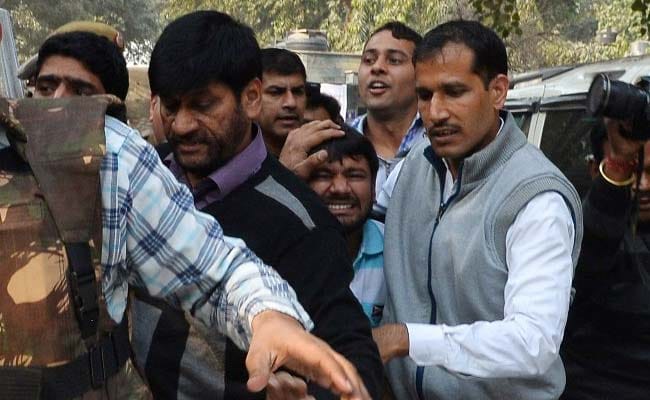
Kanhaiya Kumar, the JNU student arrested for sedition, was attacked at a Delhi court.
- Delhi Police Chief says attack on JNU student leader was 'jostling'
- Kanhaiya Kumar was punched, kicked by group of lawyers before his hearing
- Kumar, charged with sedition, sustained abrasions on face, neck and legs
Did our AI summary help?
Let us know.
New Delhi:
As he was being taken into a Delhi court today, Kanhaiya Kumar, the JNU student arrested on sedition charges, was punched and kicked. "I do not think he was beaten up, there was a lot of jostling," assessed the capital's police chief, BS Bassi.
Once inside court, in a waiting room, a man came up to the student and struck him, before being allowed to walk away.
Mr Kumar, a student leader from the famous Jawaharlal Nehru University or JNU, told the judge that he was manhandled on the way in. A doctor who examined him reported abrasions on his neck, face and legs.
Mr Bassi stressed that the student was given thick police cover as he was brought to court and that he was guarded by a riot shield. Lawyers went up to policemen at the court and bragged, "We've done our bit, we hit him".
Today, like on Monday, the court where Mr Kumar's case is being heard turned into a battle zone with belligerent lawyers brazenly attacking journalists while the police did little to help. As the pictures were broadcast on news channels, the Supreme Court rushed over senior lawyers who reported "an atmosphere of fear and terrorizing" and indicted the police for failing even basic crowd control.
But Mr Bassi feels differently. "I do not think you can say the situation went out of hand", he told reporters.
The arrest of Mr Kumar last week has handed the government an industrial-strength controversy, with the opposition and large sections of students and teachers at JNU describing the sedition charge as an unwarranted over-reaction. The government has rejected that charge.
The row has rung up a litany of headlines, many of them centred around Mr Bassi, who described Monday's assault of journalists and supporters of Mr Kumar as "incidents of a minor nature".
Once inside court, in a waiting room, a man came up to the student and struck him, before being allowed to walk away.
Mr Kumar, a student leader from the famous Jawaharlal Nehru University or JNU, told the judge that he was manhandled on the way in. A doctor who examined him reported abrasions on his neck, face and legs.
Mr Bassi stressed that the student was given thick police cover as he was brought to court and that he was guarded by a riot shield. Lawyers went up to policemen at the court and bragged, "We've done our bit, we hit him".
Today, like on Monday, the court where Mr Kumar's case is being heard turned into a battle zone with belligerent lawyers brazenly attacking journalists while the police did little to help. As the pictures were broadcast on news channels, the Supreme Court rushed over senior lawyers who reported "an atmosphere of fear and terrorizing" and indicted the police for failing even basic crowd control.
But Mr Bassi feels differently. "I do not think you can say the situation went out of hand", he told reporters.
The arrest of Mr Kumar last week has handed the government an industrial-strength controversy, with the opposition and large sections of students and teachers at JNU describing the sedition charge as an unwarranted over-reaction. The government has rejected that charge.
The row has rung up a litany of headlines, many of them centred around Mr Bassi, who described Monday's assault of journalists and supporters of Mr Kumar as "incidents of a minor nature".
Track Latest News Live on NDTV.com and get news updates from India and around the world

